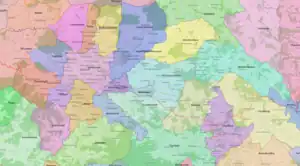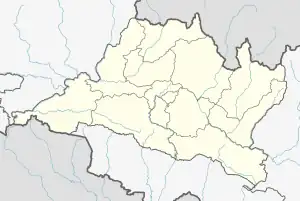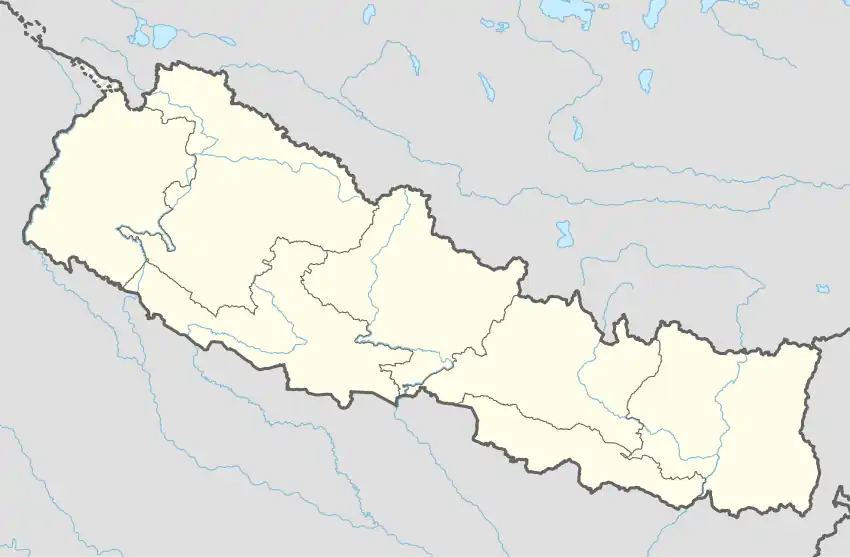Shankharapur Municipality
शंखरापुर नगरपालिका | |
|---|---|
 | |
 Shankharapur Municipality Location in Nepal  Shankharapur Municipality Shankharapur Municipality (Nepal) | |
| Coordinates: 27°44′48″N 85°30′35″E / 27.74667°N 85.50972°E | |
| Country | |
| Province | Bagmati Province |
| District | Kathmandu |
| Established | December 2014 |
| Government | |
| • Type | Local Level |
| • Mayor | Ramesh Napit (RPP) |
| • Deputy Mayor | Samita Shrestha (NC) |
| Area | |
| • Total | 60.21 km2 (23.25 sq mi) |
| Population | |
| • Total | 25,338 |
| • Density | 420/km2 (1,100/sq mi) |
| • Ethnicities | Newar Bahun Chhetri Tamang Magar |
| Time zone | UTC+5:45 (NST) |
| Website | www |
Shankharapur is a municipality in Kathmandu District in Bagmati Province of Nepal that was established on 2 December 2014 by merging the former Village development committees Bajrayogini, Karkigaun, Bhulbu, Indrayani, Lapsiphedi, Naglebhare, Pukhulachhi and Suntol.[1][2] The office of the municipality is that of the former Pukhulachhi village development committee in the old Newari town of Sankhu.
In the Local Level Election 2079, Ramesh Napit of Rastriya Prajatantra Party was elected as mayor securing 3,731 votes and Samita Shrestha of Nepali Congress was elected as Deputy Mayor securing 5,658 votes.[3]
Demographics
At the time of the 2011 Nepal census, Shankharapur Municipality had a population of 25,558. Of these, 41.1% spoke Nepali, 34.9% Tamang, 23.2% Newar, 0.1% Bhojpuri, 0.1% Gurung, 0.1% Magar, 0.1% Maithili, 0.1% Rai, 0.1% Sherpa and 0.1% other languages as their first language.[4]
In terms of ethnicity/caste, 35.1% were Tamang, 25.1% Newar, 18.5% Chhetri, 14.2% Hill Brahmin, 1.4% other Dalit, 0.8% Gharti/Bhujel, 0.8% Kami, 0.8% Magar, 0.7% Gurung, 0.6% Damai/Dholi, 0.5% Thakuri, 0.4% Sunuwar, 0.2% Rai, 0.1% Danuwar, 0.1% Lhomi, 0.1% Musalman, 0.1% Sanyasi/Dasnami, 0.1% Sarki, 0.1% Sherpa, 0.1% other Terai and 0.4% others.[5]
In terms of religion, 64.3% were Hindu, 34.5% Buddhist, 1.1% Christian and 0.1% Muslim.[6]
In terms of literacy, 71.9% could read and write, 1.9% could only read and 26.1% could neither read nor write.[7]
References
- ↑ "Govt announces 61 municipalities". The Kathmandu Post. 3 December 2014. Retrieved 2 December 2014.
- ↑ "Govt creates 61 new municipalities". República. 3 Dec 2014. Retrieved 2 Dec 2014.
- ↑ "मतगणना प्रगतिको विवरण". result.election.gov.np. Retrieved 2022-05-17.
- ↑ NepalMap Language
- ↑ NepalMap Caste
- ↑ NepalMap Religion
- ↑ NepalMap Literacy
External links

